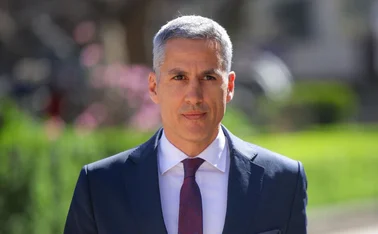
The contenders to succeed Zhou as governor at PBoC

China's new political elite is set to name the successor to Zhou Xiaochuan as governor of the People's Bank of China (PBoC) within the next few weeks, if not earlier, according to an article published by the Central Banking Journal written by contributing editor Hui Feng, the author of a new book, The Rise of the People's Bank of China, due to publication by Harvard University Press in March
The most likely candidates to take over the sobriquet as ‘Mr RMB' include long-time front-runner Guo Shuqing, chairman of the China Securities Regulatory Commission (CSRC); Shang Fulin, chairman of the China Banking Regulatory Commission; Lou Jiwei, chairman and chief executive of sovereign wealth fund China Investment Corporation; Xiang Junbo, chairman of the China Insurance Regulatory Commission; and Xiao Gang, president of the Bank of China – long considered a ‘dark horse' but whose campaign has made substantial headway in recent months.
The five candidates match the closest profile for a central bank governor among members of the Communist Party's new Central Committee, a 205-member body that includes the country's top leaders. Changes in the membership list tend to signal potential reshuffle of government ministers, including the managerial team of China's financial sector and its economy.
Notably absent on the latest Central Committee formed by China's new general secretary, Xi Jinping, and premier, Li Keqiang, is incumbent Zhou, who this month turns 65 – the mandatory retirement age for an official Zhou's level. "Indeed, his pending step-down from the PBoC governorship was signalled strongly when, as a Central Committee member, he failed to make the step-up to enter the party's Politburo in the previous Party Congress, which would have landed him a vice-premier or state councillor role with the finance portfolio in the government, which has a more lenient retirement age limit of 67," the article said.
Whoever succeeds Zhou will run the central bank at the world's second most important economy and arguably the world's most important engine of economic growth. Zhou's successor will also have a hard act to follow as the incumbent's achievements have already had a major influence in China's modern history of economic governance.
Although Guo is more popular among market participants, he appears to lack some of the political support from top officials that Xiao enjoys
Zhou is China's longest-serving central bank governor, taking over the position from Dai Xianglong in December 2002, after previously holding the post of chairman of the CSRC. While the PBoC may have gained policy authority in the 1990s as the central bank became a political ally of then-premier and former governor Zhu Rongji, it was under Zhou's governorship that the PBoC became an authoritative, assertive and innovative institution, and an indispensable problem-solver for the political leadership – and potentially the lead player in any super-regulatory agency, should China's new political leaders choose to merge its disparate regulatory bodies.
"Zhou is considered by many as the most academically capable of the current Chinese leadership, a technocrat with high intellect, diplomacy, sensibility, work ethic and holistic thinking," said the Central Banking Journal article 'the next 'Mr RMB'. "A strong and vocal advocate of further liberalisation in the financial sector, Zhou's tenure at the PBoC has been tumultuous, high profile and sometimes controversial."
Zhou will likely be best remembered for having engineered the partial relaxation of China's exchange rate regime in 2005, which resulted in him gaining the sobriquet ‘Mr RMB' by some in the media. But he has also made a bigger role for monetary policy in Beijing's macroeconomic management and was instrumental in leading banking reforms since 2003 and wider financial reforms in sectors such as the stock market and the corporate bond market.
Under Zhou's governorship, the central bank also initiated a bold reform of the interest rates regime in 2012 and the internationalisation of the renminbi since 2010.
The contenders
Compared with other candidates, Xiang, who holds a bachelor degree in finance and economics and a PhD in law from Peking University is viewed as a latecomer in the financial circle. Shang Fulin, 61, and Guo Shuqing, 56, represent the best matches in terms of their profile compared with Zhou at the time he took the helm of the PBoC. Both have worked as vice-governors at the central bank, run one of China's four largest banks and currently heads a regulatory agency.
Shang has relatively longer work experience at the PBoC (18 years), with a six-year period as deputy governor of the central bank in charge of monetary policy but is known for favouring a more cautious, if not conservative, approach to financial reforms. Guo, on the other hand, is believed to be an enthusiastic reformer, and was widely seen as the front-runner for the job up until the Party Congress late last year.
Like Zhou, Guo is a well-respected scholar and was an architect of China's economic reform plans during the 1980s. But Guo's previous appointment at the central bank has been brief compared with those of Shang and Xiao, although he has held positions as vice-governor of the PBoC and head of China's foreign exchange regulator for four years since 2001, before serving as president of China Construction Bank (CCB) and then succeeding Shang to head China's securities regulator in late 2011.
"Guo is known as a man of great ambition, with a personal style of straight talk, excellent coordination capacity and cross-cultural communication skills," said the Central Banking Journal article. "Guo was pivotal in the shareholding reforms of the CCB and its eventual share listings in Hong Kong and Shanghai in 2005, but he is mostly renowned for ‘Guo's Reform', a term coined by domestic media that refers to a slew of reform measures under his leadership at the CSRC aimed at bringing order to China's often-chaotic stock market and cultivating a more open and transparent market."
Installing Guo as the PBoC governor would likely indicate Beijing's intention to press ahead with some of the long-awaited financial reforms such as breaking the state bank's monopoly in the banking sector and relaxing controls over cross-border capital flows, the article added.
Xiao Gang is the only president of a large state bank that was named a full member of the Central Committee and therefore eligible for the top job at the PBoC. Xiao spent 22 years within the PBoC – almost his entire career – before running the BoC. He was made the youngest departmental head at the PBoC at the age of 36 and, four years later, was promoted to vice-governor in charge of monetary policy in 1998 before being parachuted to BoC in 2003. Aged 54, Xiao is a representative of the younger generation of financial elite in China; young enough to serve a full 10-year term were he to succeed Zhou.
"Xiao is often portrayed as an official with unique charisma, ambitious yet pragmatic and low key – someone who rarely attends banquets," the article said. "Although Guo is more popular among market participants, he appears to lack some of the political support from top officials that Xiao enjoys."
The article explains that Xiao assisted and impressed Wang Qishan, then vice-governor of Guangdong Province, in clearing up the mess after the collapse of Gitic (a major state-supported investment company), "so avoiding a default crisis at a range of state-backed financial institutions that had recklessly borrowed from the international market". Wang is now on the seven-member Standing Committee of the Politburo. "As a result, Wang's recommendations on the candidacy are likely to outweigh any personal suggestions by Zhou," the article said.
Meanwhile Lou – a former deputy finance minister – is viewed as an ideal candidate to become finance minister in the pending reshuffle. However, should he fail in that effort, the governorship might be an option.
Click here for the full article.
Only users who have a paid subscription or are part of a corporate subscription are able to print or copy content.
To access these options, along with all other subscription benefits, please contact info@centralbanking.com or view our subscription options here: http://subscriptions.centralbanking.com/subscribe
You are currently unable to print this content. Please contact info@centralbanking.com to find out more.
You are currently unable to copy this content. Please contact info@centralbanking.com to find out more.
Copyright Infopro Digital Limited. All rights reserved.
As outlined in our terms and conditions, https://www.infopro-digital.com/terms-and-conditions/subscriptions/ (point 2.4), printing is limited to a single copy.
If you would like to purchase additional rights please email info@centralbanking.com
Copyright Infopro Digital Limited. All rights reserved.
You may share this content using our article tools. As outlined in our terms and conditions, https://www.infopro-digital.com/terms-and-conditions/subscriptions/ (clause 2.4), an Authorised User may only make one copy of the materials for their own personal use. You must also comply with the restrictions in clause 2.5.
If you would like to purchase additional rights please email info@centralbanking.com








